100 days: America in a time of Trump
- Published
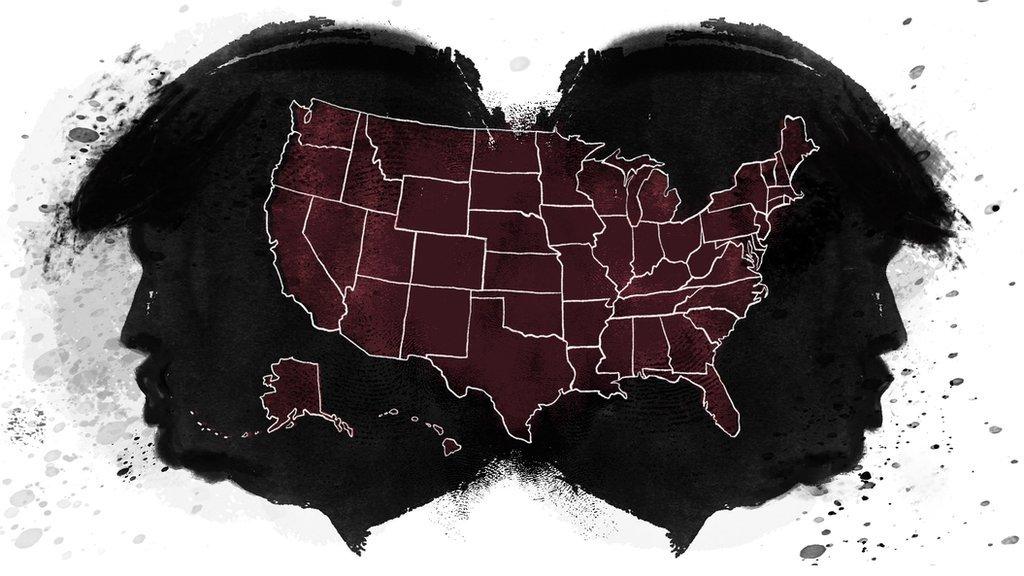
Presidential elections are always something of a national Rorschach test.
The reaction to candidates, like the perception of inkblots, helps to divulge the nation's character, underlying disorders and emotional condition. Donald Trump's unexpected victory showed that America had a split personality.
It also revealed that, among his 62 million supporters, rage and fear were over-riding emotions. Make America Great Again not only became a mission statement but a nostalgic catch-all. For many of his white working-class supporters, it implied a return to an era when the homeland was more homogenised and the world was less globalised.
The first 100 days of an administration, though in many ways a bogus measure, can also be diagnostic. They can reveal the character of a presidency and set the tone.
Also they are indicative of the health of US democracy: the functioning of its institutions, executive, legislative and judicial; the workability of the US constitution and the dispersion of political, economic and cultural power.
Inauguration day was a celebration for some, a convulsion for others. What is the state of the nation now?

The Character of the Presidency
What has become clear since Donald Trump delivered his inaugural address is that he has changed the presidency more than the presidency has changed him.
The vocabulary of President Trump, if not all his policies, is much the same as that of candidate Trump. To the White House he has brought the same aggression and plain speaking that characterised his insurgent campaign.
Social media remains his favoured conduit with the American people. Twitter is to Trump what television was to JFK and radio was to FDR. But it is his means of expression, more than the utilisation of a new medium, that marks such a break from the past.
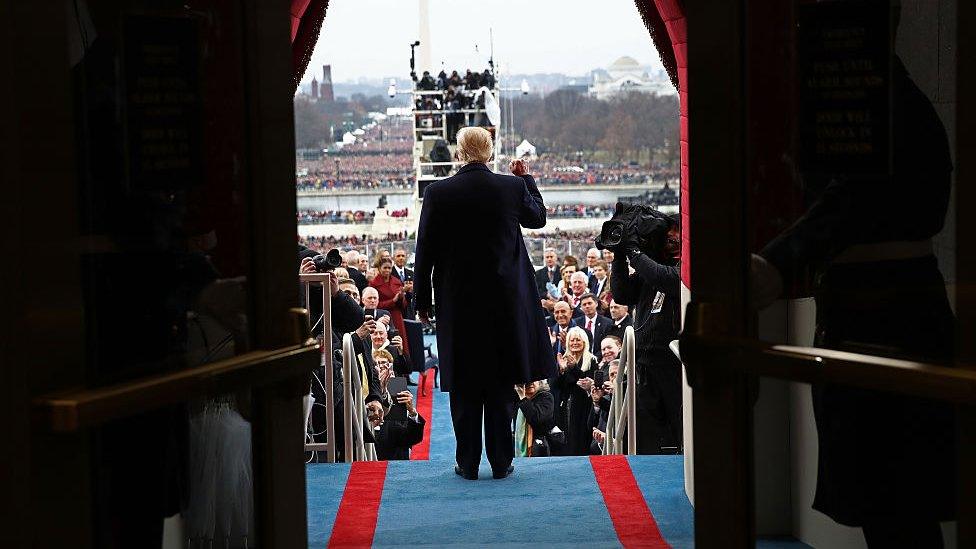
At his inaugural ball he vowed to keep tweeting. By choosing Frank Sinatra's My Way for his first dance, he also gave us a musical clue as to how he would govern. Trump would be Trump. The anti-politician had morphed into the anti-president.
His so-far unsubstantiated allegation that Barack Obama ordered the wiretapping of Trump Tower - "Bad (or sick) guy!" he tweeted - emphasised how he does not feel bound by presidential protocols or conventions. Here he disdained the longstanding tradition that incumbent presidents avoid savage attacks on their predecessors.
From his ongoing refusal to release his tax returns to his stonewalling of requests to disclose visitor logs at the White House, he has indicated normal rules do not apply to him.
All this continues to horrify his critics but not most of his supporters. They voted for unorthodoxy, and seem to have granted him dispensation to flout norms so long as he delivers results.
And yet, he has received highest marks when he is at his most conventionally presidential.
His speech to the joint session of Congress, which was similar in language and tone to normal State of the Union addresses, was probably the highpoint of his first 100 days. It got far better reviews than his inaugural, both from Republicans and some Democrats.
His decision to strike Syria also trod the path of orthodoxy. Cool-headed and cogent, his late-night statement explaining his decision to strike was also standard presidential fare. Even some of his detractors remarked how in these two moments he truly assumed the mantles of president and commander-in-chief.
Lauded by many Democrats who wished Obama had enforced his red line on chemical weapons, the strike on Syria angered some hardline loyalists.
Ann Coulter, Laura Ingraham and Michael Cernovich, a self-styled "American nationalist", were dismayed that pictures of dying children moved him so easily and that he acted like a neo-conservative rather than a neo-isolationist. Unsurprisingly perhaps, conformism infuriates the alt-right.
The divided newlyweds split over Trump's performance
Flip-flops on Syria, Chinese currency manipulation and Nato have made Trump's foreign policy appear erratic and incoherent. The confusion over whether or not his administration continues to support a two-state solution in the Middle East displayed a lack of clarity that perplexed foreign diplomats.
His congratulations to the Turkish President Recep Tayyip Erdogan following a referendum granting him more authoritarian powers was markedly different from the cautious reaction of European leaders. Ahead of the French presidential election, Trump said of Marine Le Pen "she's the strongest on borders and she's the strongest on what's been going on in France".
His words, which came close to an endorsement, prompted this shocked response from former Bush speechwriter David Frum: "Collect jaw from floor, reinsert in head."
Had one of his predecessors implied support for a far-right candidate, the political storm would have lasted days, and possibly overshadowed their entire presidency. But the response to Trump's remarks was more like a passing shower. It spoke of how quickly the abnormal has become quotidian under this presidency.
There's an argument to be made that Trump is at his most successful in foreign affairs when he's at his most unpredictable for the simple reason that is when he's most feared. The Assad regime will surely hesitate before ordering another chemical strike.
Nato's Secretary General Jens Stoltenberg said he's already seeing the effect of Trump's focus on financial burden-sharing within the military alliance. The American aid worker Aya Hijazi was released after three years in detention only when Trump raised her case with President Sisi.
At the United Nations, there's a new focus on reform, especially of peacekeeping operations. This is partly because there is a new reformist Secretary General, Antonio Guterres, but mainly because of the fear that the US, by far the organisation's biggest donor, could pull funding. Trump has brought a fear factor to the American presidency often absent during the Obama years.
Richard Nixon labelled this kind of strategic unpredictability the Madman Theory, and saw it as an essential diplomatic tool. Communist bloc leaders, the theory went, would not provoke America because of the unpredictability of the president's response. It might be crazed. Nuclear even.
But the fact that Nixon used this approach in Vietnam shows its shortcomings. In the present context, it's a risky approach to apply to North Korea, but the Trump administration clearly believes "the era of strategic patience" towards Kim Jong-un is over, and that sabre rattling will jolt Beijing into pressuring Pyongyang. The next 100 days, presumably, will tell.
Overall, there's a "good cop, bad cop" dynamic to the Trump administration's diplomacy. Mainstream foreign policy types such as Defence Secretary James Mattis and Secretary of State Rex Tillerson adopt the more conventional approach. Trump lends menace, often through his tweets.
Sometimes the very administration seems to have a split personality. Yet the first 100 days have probably yielded more results in the foreign realm than the domestic.
Noticeable in these first 100 days has been the corporatisation of the presidency. There's a chairman-of-the-board feel to his daily routine, with its meetings and photo opportunities that often place him in a leather-backed chair in the presidential boardroom - the West Wing basically has two, the Roosevelt Room and the Cabinet Room - surrounded by corporate chiefs. His cabinet is also packed with fellow billionaires and multi-millionaires.
This raises the question of whether a super-rich president at the head of a super-rich cabinet can remain a working-class hero in the all-important Rust Belt. After spending time last week in the Ohio River Valley, which is dotted with derelict steelworks, what struck me was how few of his supporters cared. "No-one works for a poor man," said one Trump devotee.
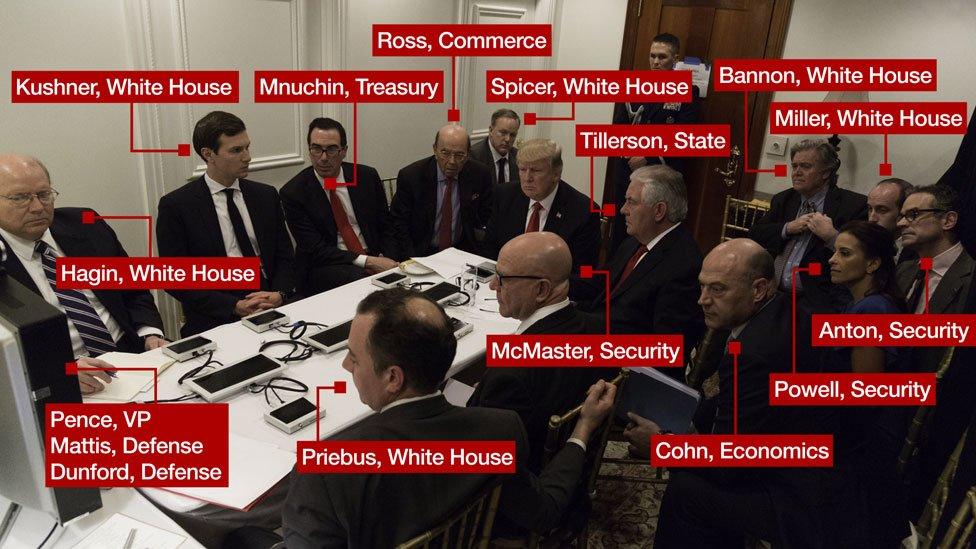
Some of the Trump Cabinet and his senior advisers recieve a briefing on the US air strike on Syria
There's a nagging sense one business that's undoubtedly seen an uptick is Trump Inc.
Potential conflicts of interests abound, and it is hard sometimes to differentiate where the presidency ends and the family business begins.
There's been criticism that Trump spends so much time at resorts owned by the Trump Organization. The mixing of business with the presidency could yet be his undoing .
An aim of staffing the administration with so many executives was to vest government with corporate know-how and efficiency. But this presidential start-up has been surprisingly accident-prone, critics would say incompetent.
Whether with big-ticket items such as the original travel ban or fairly trivial matters, like misspelling Theresa May's name in a White House memo handed to reporters, it has often shown itself to be slapdash.
Turf battles between hardline figures like Steve Bannon and moderates like Jared Kushner also belie Trump's boast that it is a "fine-tuned machine". David Brooks, a conservative columnist for the New York Times, has labelled it "a golden age of malfunction".
When a new administration fumbles what should have been a pro-forma presidential statement marking Holocaust Remembrance Day you sense there is a problem. When the White House spokesman claims that Hitler did not use chemical weapons against his own people, it suggests it has lost the historical plot.
These last examples showed not only a disregard for detail but also an apparent disdain for truth. The first 100 days has produced a litany of falsehoods. A scorecard compiled by the website Politifact, external found that of Trump's statements 69% were either mostly false, false or "pants on fire".
Alternative facts: Kellyanne Conway was lampooned when she first used this Orwellian-sounding phrase, but it perfectly captured the twilight zone of truth often found at 1600 Pennsylvania Avenue. Under Donald Trump, the White House is no longer a reliable source.
Victories are often lost in the swirl of controversy. Illegal crossings over the southern border have fallen sharply, by 40% during the first month of Trump's presidency, according to the Department of Homeland Security.
That's the steepest decline since 2009. With immigration arrests up by almost a third in the first month, there's a feeling among his supporters that he is delivering on his pledge to protect America's border, even if construction has not yet started on his famed wall.
Trump would argue he has already made the homeland safer.
A by-product of Trump's troubled presidential launch has been to burnish the reputations of his predecessors. For Democrats, the idolatry of Barack Obama gathers pace. George Herbert Walker Bush, recently ailing in hospital, has become even more of a revered national elder.
His son, George W, the one-time Toxic Texan, has been subject to some speedy historical revisionism. Not only has his newly published collection of portraits of wounded warriors won acclaim, as a work of the hand and the heart, his reported remarks at Trump's inauguration - "That was some weird sh**" - have come close to making him a folk hero of the left.
Might Trump one day be subject to this kind of reassessment? The hostile commentary on him is similar to the scorn heaped on Ronald Reagan. Yet the movie star president is now widely seen as the leader who, by winning the Cold War, ended America's long national nightmare after Vietnam and Watergate.
Lyndon Baines Johnson was pilloried as a racist vulgarian, but nonetheless enacted transformative legislation such as the 1964 Civil Rights Act, dismantling segregation, and launching Medicare.
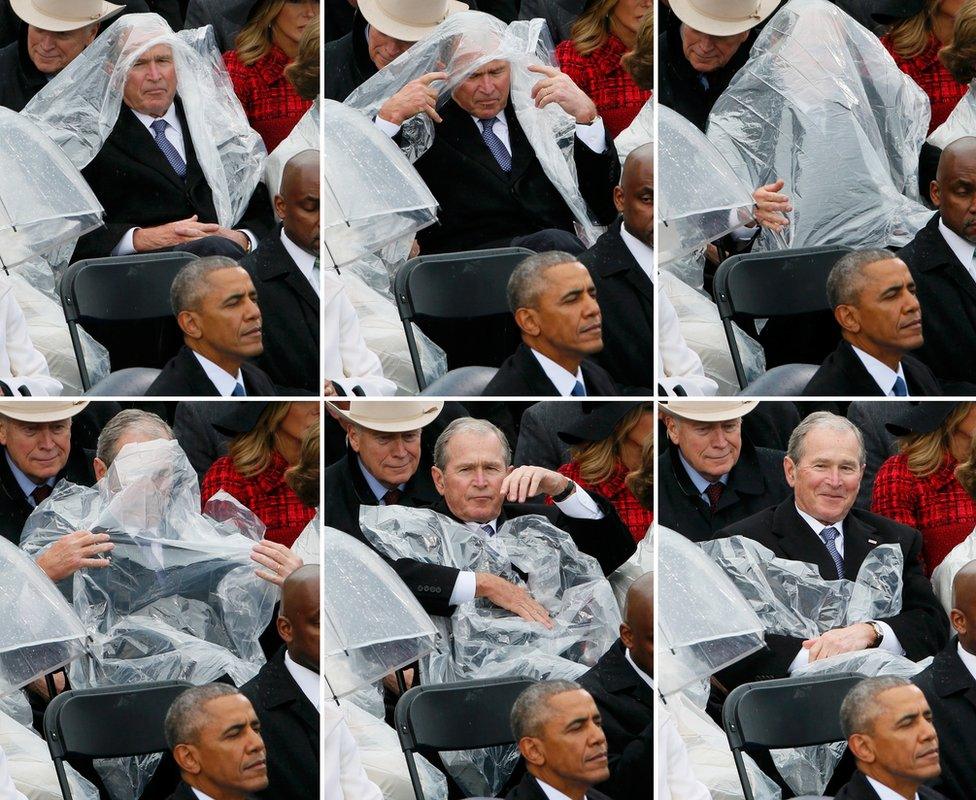
Remember this guy?
History remembers John F Kennedy's early presidency for the elegance of his inaugural address and the photogenic beauty of his New Frontier, but his first months in office were full of missteps.
They included the Bay of Pigs, a string of congressional setbacks and a disastrous summit with Nikita Khrushchev in Vienna, which emboldened the Soviet leader to build the Berlin Wall. While Trump cannot yet boast much of a record of accomplishment in these first 100 days, there are still 1361 to go.

Checks and Balances
A "civics lesson from hell" was how the Harvard academic Louis Menand described the contested aftermath of the 2000 presidential election, with its hanging chads, thwarted recounts and litigation. Not since the Supreme Court handed down its ruling in Bush versus Gore has the US constitution faced such a stress test.
Now, as then, we have learned where power in America truly lies, and how the checks and balances hard-wired into the US system operate in practice.
Donald Trump's executive power has continually been constrained. After signing that early executive order banning entrants from seven mainly Muslim countries, the courts intervened to block him.
It was an early constitutional test. But although Trump railed against the "so-called judges" who thwarted him, using unusually vehement language, his administration abided by the court's decision and kept within the law. With the checks and balances working as the founding fathers intended, a constitutional crisis was averted.
With Trumpcare, it wasn't the courts that blocked Trump but Congress. As he sought to repeal and replace Obamacare, Trump could not even secure a simple majority in a House of Representatives under Republican control.
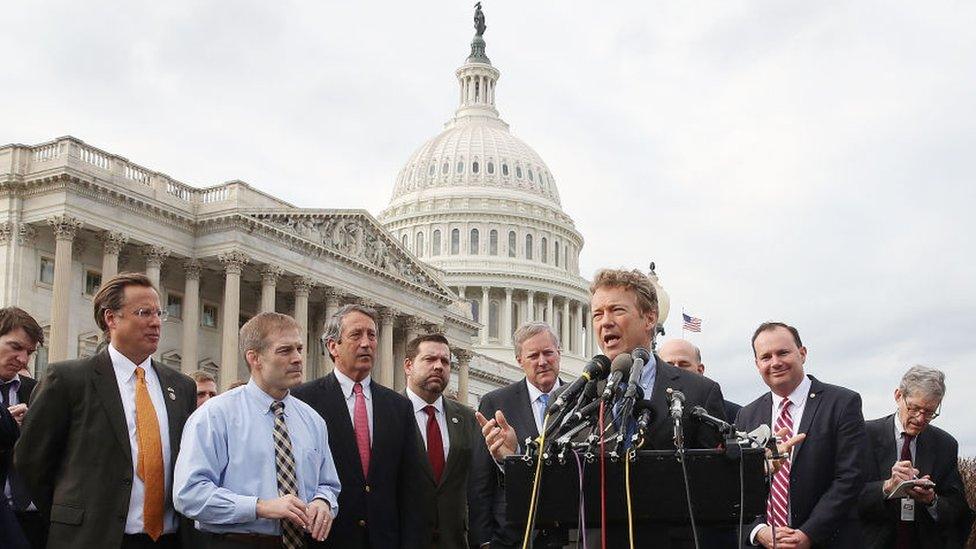
Trump's promise to repeal Obamacare was stymied - by fellow Republicans
Had his healthcare proposals cleared that hurdle in the lower house, parts of the reform package would have run into trouble in the Senate. There the Republicans also enjoy a majority but not one big enough to enact bills into law without bipartisan support. With the legislative branch restraining the executive branch, again the constitution worked as intended.
The Republican leadership, frustrated by these checks, successfully removed one of them: the use of the filibuster in blocking nominees to America's highest court - in this instance, Trump's nominee Neil Gorsuch.
This did not involve an amendment to the constitution, rather a revision of Senate rules, but it was nonetheless momentous. This nuclear option, as it is called, delivered a clear win for the president: the elevation of Judge Gorsuch to the bench. However, the filibuster remains intact to block his legislative agenda, and Democrats will use it to thwart Trump.
In recent years, as Washington has become more ungovernable, there's been a growing literature about the inoperability of the constitution, and how its checks and balances have acted more like spanners in the works.
Just as Republicans, the great practitioners of the politics of No, used the constitution to stymie Barack Obama, Democrats are relying upon it to impede Donald Trump. For them, the constitution must now seem timeless and timely. A number of Democrats have told me that the genius of the Founding Fathers was to anticipate this kind of presidency.
In these first 100 days, we have been reminded of the power of states and municipalities. We have seen an inversion of the doctrine of states' rights. For decades, states' rights was the battle-cry of white supremacists determined to uphold segregation in defiance of federal court orders demanding integration. Now progressive states are using this principle.
Some of the biggest cities in the country, including Boston, Chicago, Los Angeles, New York and Washington DC, are wilfully obstructing Trump's immigration crackdown. Thus, sanctuary cities have become to the progressive left what segregationist citadels were to the racist right, emblematic battlefields in a tug of war between local government and the federal government.
Similar battle-lines have been marked out over climate change.
Protest power has also emerged as a significant force, as something akin to a national passion play has unfolded on the streets. The sea of pink pussy hats at the massive women's marches on the first weekend of the presidency vividly highlighted a new sense of personal political empowerment: people ready to take matters into their own hands.
The speed at which demonstrators congregated at US airports in the immediate aftermath of the ban surely had an emboldening effect on the state attorneys general who successfully challenged it in the courts.
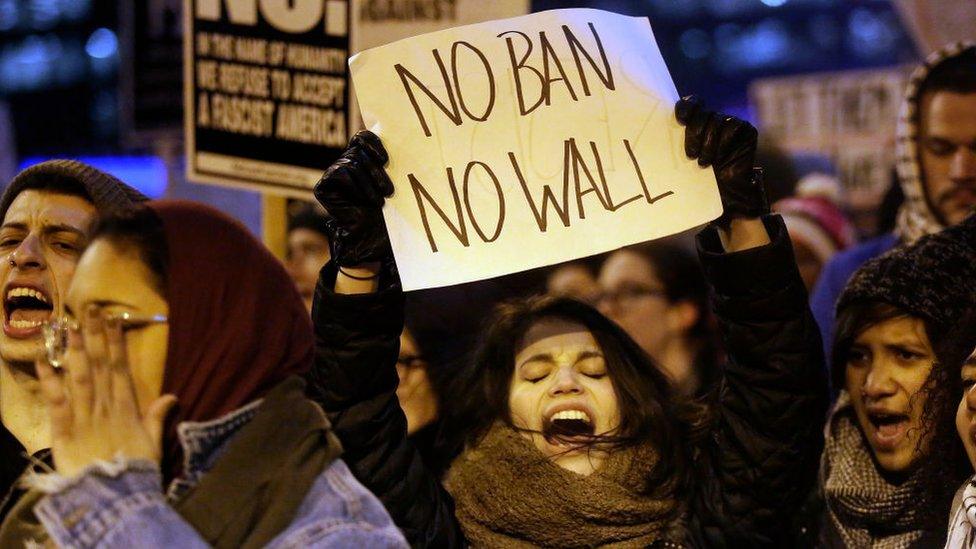
The death certificate of Trumpcare may have been signed in the House of Representatives, but mortal wounds were inflicted in those angry town meetings, which alarmed Republican lawmakers. Maybe one of the reasons President Donald Trump has not yet returned to Trump Tower in Manhattan is the fear of massive demonstrations in the city of his birth.
For the past eight years, popular anger was on the right of US politics. Now it is on the left. The pertinent political question over the coming years will be to what extent the Democratic Party can harness this street agitation.
Will there be a Tea-Party-style mobilisation of progressives that translates into real political power? Or are opponents of Donald Trump pinning more faith in pressure groups than the Democratic Party?
The American Civil Liberties Union, for example, has witnessed a fundraising bonanza. The ACLU raked in $24m (£18.7m) in online donations the weekend after the first travel ban, six times the amount it normally raises in a year.
Constrained by Congress, the courts and his own party, so far this has not been an imperial presidency, the phrase coined by the historian Arthur M Schlesinger Jr to describe the Nixon White House, which was accused, even before the Watergate break-in, of pushing constitutional bounds.
Rather it has been an inhibited presidency, in which Donald Trump has been made all too aware of the limits of his executive power.

Economy, Business and Culture
Donald Trump's promise to Make America Great Again was primarily an economic pledge, and there were early signs of a Trump Bump on Wall Street and Main Street.
Just three trading days after the new president took the oath of office, the Dow Jones Industrial Average broke through the 20,000 mark for the first time in its history. Investors expected him to slash corporate taxes and set fire to business regulations. Not since 2000, a report suggested last month, has consumer confidence been so buoyant.
This rosy soft data has not been matched by hard economic data. The US economy added just 98,000 jobs in March, almost half of what some economists expected. Industrial production and housing starts were lower than expected.
Retail sales, which should have risen with consumer confidence, actually fell by 0.2% in March, their first decline in over a year. The markets, having watched the healthcare debacle, are no longer so confident Trump can deliver lower corporate tax rates and a $1tn infrastructure spend. Barron's, the weekly financial newspaper, recently opined: "Trump bump, we hardly knew ye."
As for the impact of Trump's "Buy American, Hire American" doctrine, it is too early to judge. Industry groups have voiced concerns it will raise costs, making it prohibitively expensive to build the new bridges and roads. The tech sector is worried Hire American policies will block or discourage high-skilled immigrants. The tourism industry is reporting a "Trump Slump," because of the off-putting effect of the travel ban and its author.
After signalling his willingness to name and shame corporations accused of exporting US jobs abroad or stiffing the federal government, there's evidence it has had a chastening effect. Presumably, no senior executive of a publicly traded company wants to reach for their smartphone in the morning to find their name on his Twitter feed, if only because of the effect it can have on the share price.
Boeing, a company that Trump shamed publicly during the transition, says it's made progress with the administration over bringing down the costs of the replacement for Air Force One. The Trump administration also claims to have created jobs by pressuring major corporations to invest in new American plants.
Most of these expansion plans were in place, however, before Barack Obama left office.
That's true of Ford's Michigan investment, ExxonMobil's Gulf Coast expansion, and Intel's Arizona plant, all of which were touted by the administration as totems of Trumpism.
Arguably, the main effect of his self-congratulatory tweets about saving US jobs has been political rather than economic.
It has persuaded blue-collar voters that this billionaire populist is battling on their behalf. As for his tweets lambasting business? They've created a love/fear relationship with the corporate sector, which welcomes his deregulation and proposed tax cuts but not necessarily his efforts to roll back globalisation.
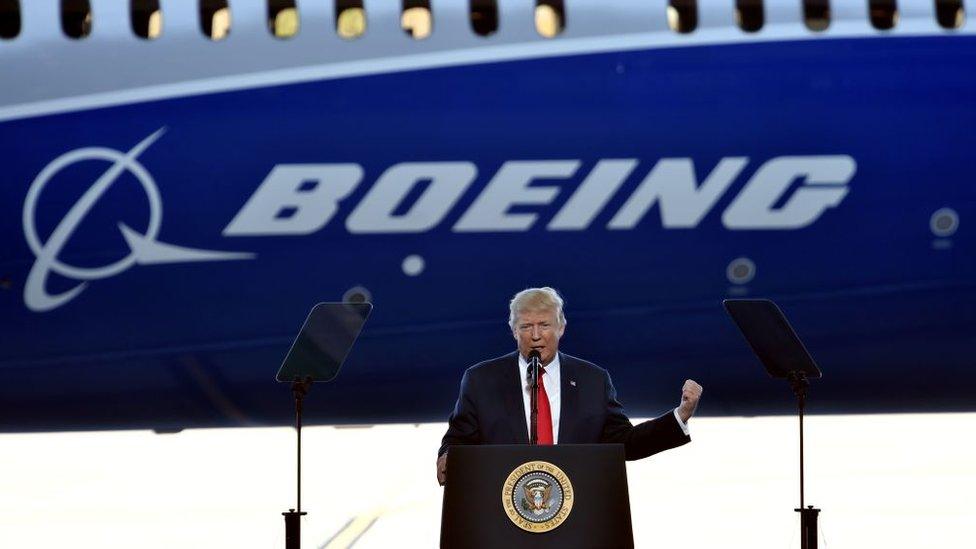
One sector that has undoubtedly benefited from a Trump bump is the media. The New York Times and Washington Post have seen subscriptions soar. CNN, a network of which obituaries were being written only a few years ago, is enjoying a ratings windfall. Twitter, whose once stagnant user numbers have risen, is finally winning again.
Despite high-profile exits, Fox News remains the most influential news channel in America, if only because its breakfast show Fox and Friends is what Trump watches in the morning.
Overall, the response of the US journalistic community to Trump's presidency has been to become more adversarial. Reporters like Jim Acosta, anchors like Jake Tapper, and even mild-mannered Wolf Blitzer have adopted a more hard-edged approach. The New York Times has replaced bland headlines with more judgemental wording.
A headline three days into his presidency signalled its new approach: Trump Repeats Lie About Popular Vote in Meeting With Lawmakers.
Elsewhere, cultural lines are being blurred, an inevitable response perhaps to a president who turned politics in a new reality show genre. Comedians, faced with the dilemma of satirising a self-satirising White House, have adopted a more journalistic persona. John Oliver and Samantha Bee mix gags with serious reportage, much of it directed against Trump.
Stephen Colbert, who struggled at first as David Letterman's successor after shedding his mock right-wing persona, may overtake apolitical Jimmy Fallon in the late-night ratings.
The mimicry of Alec Baldwin and the casting of Melissa McCarthy as Sean "Spicey" Spicer have once again made SNL appointment viewing.
In the arts, the expectation is that Trump will produce a burst of creativity, in line with the "Take your broken heart, make it into art" plea from Meryl Streep at this year's Golden Globes. But much of that art, whether paintings, screenplays or novels, may still be unfinished.
President Trump joked about the special relationship with the UK after the BBC political editor's question
Just as we await the great Trump-era movie - a Doctor Strangelove, The Deer Hunter or Wall Street - there's not yet been a great Trump-inspired novel. For now, literary classics are filling the void. George Orwell's 1984, with an assist from Kellyanne Conway's "alternative facts", rose to the top of best-seller lists.
Philip Roth's The Plot Against America, which imagines as president Charles Lindbergh, the aviator who became the spokesman of the America First Committee in the early years of World War Two, has also enjoyed a revival. Hulu is streaming a dramatisation of Margaret Atwood's The Handmaid's Tale, which imagines a totalitarian America.
On Broadway, a stage adaptation of 1984 is in the works. Then there has been the unexpected success of Come From Away, a feel good 9/11 musical of all things, which tells the story of the nearly 7,000 airline passengers stranded in Gander, Newfoundland, in the aftermath of the September 11 attacks.
Foot-tapping and tear-jerking, the show is all about making outsiders feel at home. Rather pointedly, the Canadian Prime Minister Justin Trudeau took Ivanka Trump to see it.
Next month unveils the fifth season of House of Cards, but in the wake of accusations of Russian meddling, its plotlines, once considered so outlandish, now seem more run-of-the-mill, a case perhaps of life overtaking art.

Two Americas
To journey from the major coastal cities into the American heartland feels right now like travelling between different countries. There has long been two Americas, one that favours pick-up trucks over Prius hybrids, Walmart over Whole Foods, Duck Dynasty over This American Life. This age of Trump, as well as accentuating those divisions, has brought with it new identifying markers.
Do you wear a scarlet Make America Great Again baseball cap or a pink woollen hat? Would you buy an Ivanka Trump dress? Do you agree with Alex Jones, the host of the far-right Infowars, or Van Jones, CNN's leading pundit? Or, more simply, do you have faith in the president? Increasingly, how you respond to Trump determines which America you inhabit.
Barack Obama entered office vowing to bring together red and blue state America, though he was a deeply polarising figure who singularly failed in that endeavour. Donald Trump has not tried particularly hard to be a unifying figure.
His travel largely has been to states that voted for him. Many of his appearances outside the White House and Mar-a-Lago have essentially been campaign rallies. His Attorney General Jeff Sessions, angry that a judge had challenged the latest travel ban, even referred to Hawaii, which achieved statehood in 1959, as "an island in the Pacific".
My own travels around the country, mainly into the Bible and Rust Belt, suggest he remains strong in the regions that sent him to the White House. Last week on the Ohio River Valley, businessmen told me how the Trump Bump is for real. They see it on their balance sheets, with the relaxation of Environmental Protection Agency rules over coal often cited as the reason for the turnaround.
Trump's presidency a big hit in Rust Belt
Many Rust Belt voters continue to adore Trump because liberals hate him so. They voted for the billionaire partly to punch sneering bicoastal liberals in the nose. They are enjoying the sight of elite blood being shed in such quantities.
Because of the shadow cast by the Russian allegations, these first 100 days have sometimes felt like the final days of an ailing administration. Trump is routinely cast as a modern-day Richard Nixon. Yet while it is difficult sometimes to see how this administration can remain viable in its present form, it is harder to imagine how it would be brought to a premature end.
Barring some catastrophic revelation emerging from the FBI's investigation into Team Trump's alleged links with the Kremlin or some massive financial scandal, the Republican leadership is unlikely to move against him. In the unlikely event that it launched impeachment proceedings, here the constitution is his friend.
It is hard to dislodge an incumbent president.
The Founding Fathers, who came up with a governing model that has constrained Trump, also came up with an electoral model, the Electoral College, which has already helped him and may do so again. That will be true if the Rust Belt remains a stronghold.
My overwhelming sense, based on the popular vote in November and opinion polls since, is that more Americans are anti-Trump than pro.
But my sense also is that many blue-collar battlers remain fiercely loyal. So to write him off would be to repeat the same analytical mistake commentators have made since he first announced for the presidency, that of underestimation.
For while Democrats regard their new president as a national embarrassment, many of his supporters continue to view him as a potential national saviour.
One hundred days into a presidency the like of which this country has never seen before, the state of the union is disunion.